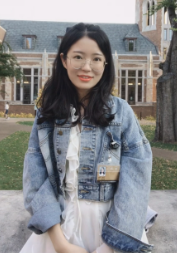 Tian Zhu, 5th year Chemical and Biomedical Engineering graduate student in the Rafat Lab
Tian Zhu, 5th year Chemical and Biomedical Engineering graduate student in the Rafat Lab
While radiation therapy (RT) is an efficient treatment for patients with triple negative breast cancer, patients continue to experience recurrence after RT. The extracellular matrix (ECM) in the tumor microenvironment plays a major role in tumor progression and metastasis. ECM structure, composition, and mechanical properties have profound effects on cell and tissue phenotype. ECM alternations in healthy breast tissue induced by radiation and its role in tumor recurrence are still unknown. In my research, we evaluated the structure, molecular composition, and mechanical properties of irradiated murine mammary fat pads (MFPs) and developed ECM hydrogels from decellularized tissues to assess the effects of RT-induced ECM changes on breast cancer cell behavior. Irradiated MFPs were characterized by increased ECM deposition and fiber density compared to unirradiated controls, which may provide a platform for cell invasion and proliferation. Encapsulated TNBC cell proliferation was enhanced in irradiated ECM hydrogels, and morphology analysis indicated an increase in invasive capacity. Our study establishes that the irradiated microenvironment influences tumor cell behavior. The developed ECM hydrogels are important for mimicking how the in vivo breast tissue environment responds to radiation damage. Currently, I am utilizing these ECM hydrogels to explore the interactions between tumor and immune cells that may contribute to recurrence following radiotherapy.
I worked with Dr. Dmitry Koktysh to investigate the mechanical properties of breast tissue by AFM in VINSE. I really enjoy the VINSE community and collaborative nature and the equipment is state-of-the-art-, improving my research greatly.